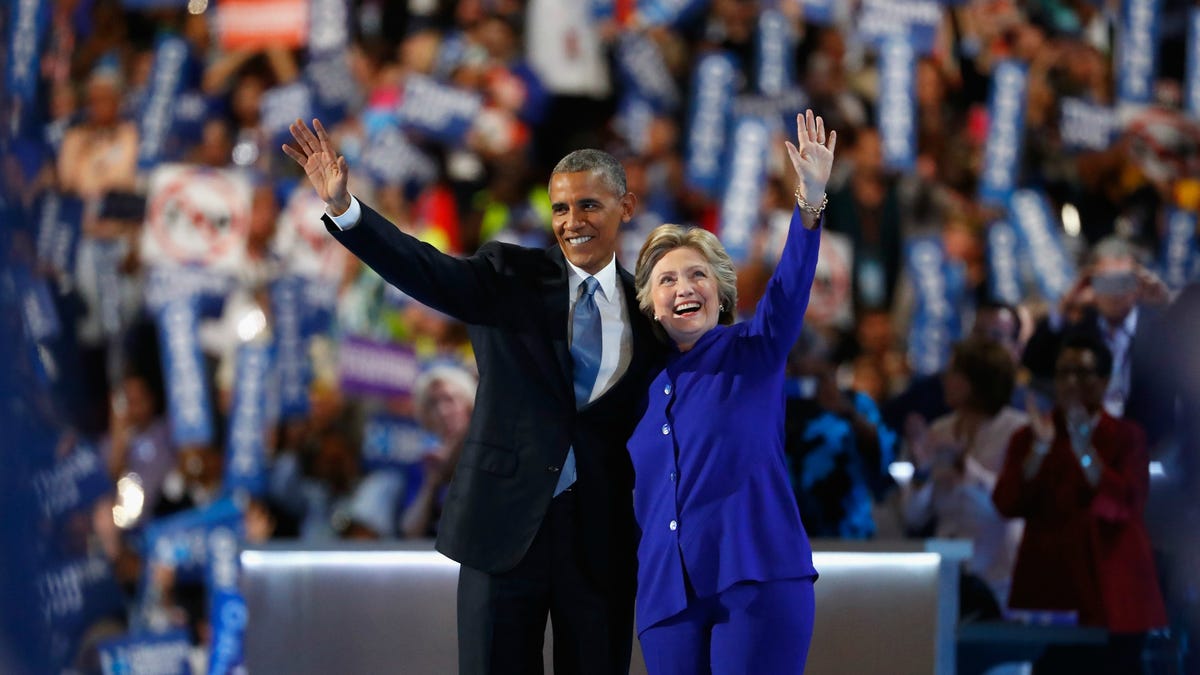Democrats mobilize tech volunteers for convention
A team of tech savvy volunteers has descended on Philadelphia to help the Democrats get the word out for Hillary Clinton.

Silvia Scandar Mahan traveled to Philadelphia for her summer vacation. Now, she's putting in more hours than she does at Cor, the San Francisco digital media startup where she works.
From 9:30 a.m. until after midnight, the 33-year-old is producing video that tells the stories of delegates at the Democratic National Convention, where Hillary Clinton was officially named the party's presidential nominee on Tuesday. During the day, she and another volunteer record caucus meetings and political events. In the afternoon, they shoot more video of the delegates and congressional leaders at the Wells Fargo Center, where the convention is being held. Then they edit the recordings into short snippets -- less than a minute long -- for sharing on the convention committee's social media accounts, websites and YouTube.
More on Election 2016
"It's exciting to be here and be a part of this," said Mahan, who volunteered for Jeb Bush's gubernatorial race in Florida as a college student. "It doesn't really feel like a vacation."
Gone are the days of campaigns getting by on volunteers distributing leaflets or cold-calling voters. Just like the broader economy, political campaigns need volunteers with highly specialized skills, including video production and social media savvy.
The DNC has recruited more than 120 people, many with social media, video and other digital skills, to work in Philadelphia, where the Democrats became the first major US political party to nominate a woman for the presidency. Like Mahan, they've made their way here to blog, tweet and share photos on Instagram and SnapChat.
Video producer Silvia Scandar Mahan is one of more than 120 volunteers at the Democratic National Convention in Philadelphia using their professional technical skills to produce digital content to tell the story of the convention and help get Hillary Clinton elected.
Kelli Klein, the Democratic National Convention Committee's digital director, is organizing the army of volunteers. One of three paid staffers, Klein is responsible for overseeing the DNCC's website, Facebook, Instagram, Twitter and Snapchat accounts are updated.
Because the demands are great and the stakes are high, Klein sought volunteers with digital or campaign-organizing experience.
"I've put a lot of trust in these people," she said.
For nearly 40 years, political conventions have been shows for mass media. Newspapers sent correspondents, radio broadcast speeches and television news captured the pomp. That means the message voters get is filtered by news organizations.
The internet changes that dynamic. Now, the parties and candidates speak directly to voters. Campaigns craft their messages for email, websites and now social media. Twitter, Facebook and Instagram, which is owned by Facebook, have become news outlets for many younger voters.
"The power of social networking for campaigns is in how they target voters," said Jennifer Stromer-Galley, a Syracuse University professor, who researches social media. Campaigns use Facebook and other social media sites to collect information on voters and then target them with messages about donating to the campaign or getting out the vote, she said.
Viraj Patel, 29, is a Philly resident with experience running Facebook, Twitter and Instagram feeds for civic organizations, including the Conference on Asian Pacific American Leadership and Philadelphia South Asian Collective.
Now, she's selecting photos for the DNC's Twitter account and helping draft tweets to promote Studio 2016, a DNC pre-show that streams before the prime-time speakers. Among the show's stars: comedian Chelsea Handler and Internet celebrity Awesomely Luvvie. She's also promoting the "Digital Balcony" and "Instagram Suite," where convention speakers tweet and have portraits taken.
Sitting in the DNC's digital war room across from the convention's souvenir shop, Patel stares at her iPhone 5S as Bill Clinton finishes his speech on Tuesday. She selects photos sent to her from other volunteers and posts tweets to the DNCC's Twitter account. The operation is fast-paced and collaborative, as the team checks the language of the tweets, picture quality of the photos, and fact-checks the content.
"It's been equal amounts of overwhelming and exciting," says Patel, who doesn't get home until 2 a.m. each night, and then puts in a full day as a college administrator. "I'm still processing everything I'm experiencing."
Not all the volunteers on the digital team have tech expertise.
Mark Jimenez, a 28-year old public policy graduate student from California, is a "runner," escorting other volunteers and campaign staff to the digital command center. Jimenez, who worked as a campaign organizer for President Barack Obama's 2012 reelection campaign, said the folks who feed volunteers are often the most cherished.
"The best volunteers are the ones you don't have to tell what to do," Jimenez said. "They just notice what needs to be done and they do it."
For Mahan, who grew up in a conservative Republican family in Florida and converted to the Democrats a decade ago, watching Obama's speech Wednesday was an emotional experience.
Mahan, who supported Obama over Clinton eight years ago, said she teared up while watching Obama give one of the last major speeches of his presidency.
Like Obama, Mahan is fully behind Clinton and ready to continue volunteering in the general election. She plans to head to Florida to make more videos or hand out fliers, if it will get Hillary elected.
"I will put forth any talents I can offer to help get her elected," Mahan said. "But I'm 100 percent ready to knock on doors, too. As much as I love creating content, the most powerful way to get your message across is one-on-one."

